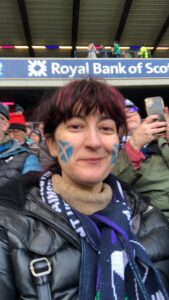
Name: Teresa Requena
School/College: The Roslin Institute
Research Area: Functional Genetics & Development
Role Name: Post-doctoral Research Fellow
X (Twitter): @NomoreLab_slave
Hi, I’m Teresa, doing my third postdoc in the Rainger lab at Roslin Institute, Edinburgh University. I want to share my #PostdocResearcherRealities because it has been a fun and scary rollercoaster.
In 2015, I was awarded my doctorate in Biomedicine, but was unsure about the next steps. On the one hand, I loved helping and teaching other people in the lab, so one possibility in front of me was becoming a technician. However, I was also passionate about exploring and developing my ideas and maybe someday having my own research group to do research that makes a meaningful difference in treating human disease and providing junior scientists with the support they need to fulfil their aspirations. The second option looks scary and tough, but I love challenges. So, I decided to continue the canonical academia pathway and become a Postdoc in the same lab as my PhD lab in Spain.
My advisor at that time suggested that I could apply for travel grants to perform an internship abroad to explore other science communities. That resulted in that instead of a normal postdoc, I did four short-term visits to labs in Luxemburg, USA, and the UK. Being a postdoc abroad can be an isolating experience. Changing countries and cultures and leaving your friends and family behind can trigger a feeling of self-isolation. To avoid self-isolation, actively engage, join a club, or undust your favourite hobbies. These side activities can help you expand your work and social network too. In fact, I’ve built collaborations with top international experts, who, contrary to popular belief, turn out to be normal people who like to chat and throw ideas over a cup of coffee or a glass of wine. Additionally, that research network allowed me to get my second and third postdoc position at Edinburgh University.
Although I love being a postdoc, I recognise that there are many challenges. The most difficult about postdoc life for me are two things. The first one is instability and precarity. A postdoc contract lasts 2 or 3 years, and after that, you don’t know if you will get a new and more stable position. That isn’t easy, especially if you want to establish a family. In my case, I love travelling and visiting new places, but I recognise that it is difficult to live only with a piece of luggage and not settle in any place because you don’t know when you have to move again. So, thinking ahead and having a career plan helps me a lot. A postdoc is meant to be a transitory period to develop and gain the needed skills for a more stable job. Taking the time to identify the skills that you need to learn during your postdoc is crucial for future success and mental health.
Secondly, work–life balance is tricky when you become a postdoc. You must keep several balls in the air. You become involved in multiple projects and academic opportunities such as teaching, mentoring, lab/field work, etc. On top of that, the roles taken in projects typically involve higher responsibility and ownership. So, to navigate these challenges, you need a supportive PI that provides a good mentorship. So far, I have been lucky with all my PIs and supervisors because they have been super supportive of my skills development journey. One of the strategies that works well for me is to be well-organised and strict with my working time, particularly by setting deadlines for my work. This strategy has made it possible to separate work and personal time, allowing me also to have time to carry out activities I enjoy personally. Accomplishing my personal goals beyond academia has helped me maintain excellent mental health.
That’s all I’ve got, folks! I hope you enjoy my journey and find a bit of helpful information to you.


